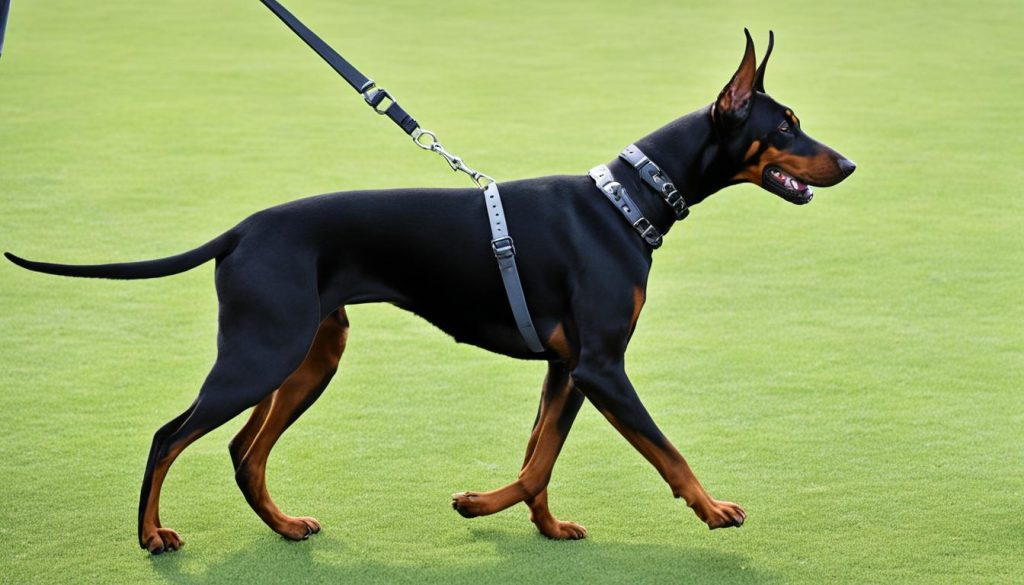Doberman Pinschers are known for their striking appearance, intelligence, and loyalty. However, like any breed, they can have behavior issues that owners need to be aware of. Common Doberman Pinscher behavior problems include aggression towards strangers and other dogs, separation anxiety, excessive barking, and destructive behavior. It’s important to understand these issues and take proactive steps to address them.
In this article, I will guide you through the various behavior issues that can arise in Doberman Pinschers and provide insights on how to manage and train your dog effectively. Whether you already own a Doberman Pinscher or are considering getting one, understanding their behavior issues is crucial for a harmonious and fulfilling relationship.
The Importance of Proper Management
As a Doberman Pinscher owner, it is crucial to understand the importance of proper management when it comes to your dog’s behavior. Due to their unique temperament and physical abilities, Doberman Pinschers require careful guidance and training from a young age to prevent behavior problems from developing.
Failure to provide adequate training and guidance can result in various issues, including aggression, separation anxiety, excessive barking, and destructive behavior. These problems can not only be distressing for both you and your dog but can also pose risks to the safety of your household and those around you.
By investing time and effort in training your Doberman Pinscher, you can prevent and address these behavior problems effectively. Training helps to establish boundaries and reinforce positive behaviors, ensuring that your Doberman becomes a well-mannered and balanced companion.
To manage Doberman Pinscher aggression, for example, it is essential to start with proper socialization from an early age. Introduce your dog to various people, animals, and environments to help them develop confidence and learn appropriate behaviors in different situations.
Separation anxiety can be mitigated through gradual desensitization and counterconditioning techniques. By gradually increasing the duration of your absences and providing engaging toys or activities, you can help your Doberman feel more comfortable and secure when left alone.
To address excessive barking, it’s important to understand the underlying reasons for your dog’s vocalizations. Through training and environmental management, you can discourage excessive barking and teach your Doberman when it is appropriate to alert you to potential threats or disturbances.
Destructive behaviors, such as chewing furniture or digging, can be redirected towards more appropriate outlets, such as chew toys and designated digging areas. By providing mental stimulation and engaging activities, you can help channel your Doberman’s energy in a constructive manner.
Remember, proper management of your Doberman Pinscher’s behavior is an ongoing process. Consistency, patience, and positive reinforcement are key to establishing a strong bond with your dog and ensuring their well-being.
Meeting the Exercise and Mental Stimulation Needs
Doberman Pinschers are highly athletic dogs that require regular exercise and mental stimulation. To keep them happy and healthy, it is important to prioritize their physical and mental well-being.
One of the key aspects of meeting the exercise needs of a Doberman Pinscher is providing regular opportunities for physical activity. Daily brisk walks and frequent opportunities for running are essential for this breed. These activities not only help to burn off excess energy but also provide mental stimulation through exploration of the environment.

In addition to physical exercise, mental stimulation is equally important for Doberman Pinschers. These intelligent dogs need to stay mentally engaged to prevent boredom and associated behavior problems. Obedience training and canine sports, such as agility or scent work, are great ways to provide mental exercise. These activities challenge the Doberman’s mind and reinforce their training, creating a well-rounded and mentally stimulated pet.
Proper leash training is another important aspect of meeting a Doberman Pinscher’s exercise and socialization needs. Dobermans are known for their strength and tendency to pull on the leash. It is crucial to teach them loose-leash walking from an early age to prevent leash pulling and maintain control during walks.
Early socialization is also vital for a Doberman Pinscher’s well-rounded development and behavior. Exposing them to a variety of people, animals, and environments from a young age helps them become confident and well-adjusted dogs. Socialization ensures that they can interact appropriately with other dogs and humans, reducing the risk of fearfulness or aggression.
By providing regular exercise, mental stimulation, proper leash training, and early socialization, you can ensure that your Doberman Pinscher remains happy, healthy, and well-behaved.
The Need for Leadership and Training
Training a Doberman Pinscher requires calm and consistent leadership. These intelligent dogs thrive when they have a confident handler who can establish themselves as the leader. Obedience training is essential to ensure that your Doberman understands and follows your commands.
To successfully train a Doberman Pinscher, it is crucial to use positive and persuasive training methods. Avoid harsh techniques that can instill fear or aggression in your dog. Positive reinforcement, such as treats, praise, and rewards, helps to motivate and encourage your Doberman to learn and obey.
Dobermans are perceptive creatures and can sense when an owner is indecisive or unsure. This is why it is important to be consistent in your training approach. Establishing clear rules and boundaries will help your Doberman understand what is expected of them.
Remember, training should be an ongoing process. It is important to continue reinforcing and practicing commands to ensure your Doberman’s training remains consistent. Regular training sessions, even for a short duration, can help strengthen the bond between you and your dog.
Early Socialization and Proper Development
When it comes to Doberman Pinschers, early socialization is crucial for their proper development and overall behavior. By exposing them to various people, animals, and environments in their early weeks and months, we can help them develop positive behavior patterns and prevent fearfulness.
During the first year of a Doberman’s life, it is essential to establish order within the family and teach the dog to comply with commands and follow the lead of the owners. This period sets the foundation for their future behavior and ensures they become well-adjusted and confident companions.
Proper socialization includes introducing the Doberman to different types of guests, including friends, family members, and strangers. It is important to expose them to various animals, such as other dogs, cats, and even small animals, in a controlled and safe manner. This exposure helps them learn to accept and interact appropriately with others.

Positive reinforcement training techniques are also essential during the socialization process. Rewarding the Doberman with treats, praise, and play when they exhibit desired behavior helps them associate positive experiences with new situations and people.
By providing early socialization and proper development for your Doberman Pinscher, you can lay the groundwork for a confident, well-behaved companion. Remember, a knowledgeable and responsible approach to their training and socialization is key to preventing fearfulness and ensuring their overall happiness and well-being.
Potential Challenges and Considerations
When considering adding a Doberman Pinscher to your household, it’s important to be aware of the potential challenges and considerations that come with owning this breed. While they can make wonderful companions, Dobermans require specific care and attention to thrive.
First and foremost, Doberman Pinschers are known for their demanding nature. They require significant attention, exercise, and companionship to be happy and well-adjusted. These dogs thrive in active households where they can be included in daily activities and receive ample mental and physical stimulation.
It’s important to note that Dobermans have strong protective instincts, which can manifest as aggression towards other animals or unfamiliar individuals. Early socialization and ongoing training are crucial to ensure that these tendencies are properly managed. Additionally, it’s important to consider the potential dominance that Dobermans may exhibit towards other dogs and cats in the household.
Owners of Doberman Pinschers should also be aware of the potential legal liabilities and insurance limitations associated with owning this breed. Some insurance companies may have breed-specific restrictions or higher premiums for Dobermans due to their reputation.
Overall, owning a Doberman Pinscher requires a dedicated and responsible owner who is committed to providing the necessary training, exercise, and socialization. With the right approach, these challenges can be effectively managed, and you can enjoy a rewarding and fulfilling relationship with your Doberman Pinscher.
Relinquishment to Shelters and Rescues
Doberman Pinschers are loyal and intelligent dogs, but they can also present behavior problems that some owners may find challenging to handle. Unfortunately, many Doberman Pinschers end up in shelters and rescues due to these issues. It is disheartening to see these beautiful animals being relinquished, but it underlines the importance of understanding and addressing their behavior problems.
Inadequate training methods can contribute to behavior problems in Doberman Pinschers. Without proper guidance, these dogs may develop aggressive tendencies or exhibit destructive behavior. Fear of the dog’s behavior can also lead to owners feeling overwhelmed and choosing to surrender their Doberman Pinscher.
Furthermore, the Doberman Pinscher breed has specific needs that require dedicated commitment from owners. These dogs thrive in households where their exercise, mental stimulation, and socialization needs are met. Lack of commitment to providing for these needs can result in a Doberman Pinscher becoming anxious, frustrated, or displaying unwanted behaviors.
When considering adopting a Doberman Pinscher, it is crucial for potential owners to thoroughly research and understand the breed’s characteristics and requirements. Taking the time to learn about Doberman Pinscher behavior problems and training tips can help prospective owners make an informed decision about whether this breed is the right fit for their lifestyle and abilities.
By understanding the potential challenges and investing in proper training and care, owners can prevent behavior problems in Doberman Pinschers and provide them with a loving and stable home.
Is a Doberman Pinscher the Right Dog for You?
If you are considering getting a Doberman Pinscher as a pet, it is essential to evaluate whether this breed is the right fit for you. While Doberman Pinschers can be wonderful companions, they require specific attention, training, exercise, and socialization.
One important factor to consider is the exercise and mental stimulation requirements of a Doberman Pinscher. These dogs are highly athletic and demand a significant amount of physical activity. Daily brisk walks and opportunities for running are crucial to keep them physically fit and mentally stimulated. Without proper exercise, Dobermans may develop behavior problems, such as excessive barking and leash pulling.
Another consideration is the potential for aggression or fearfulness in Doberman Pinschers. While their temperament has been bred to be more stable, they can still exhibit protective instincts and dominance towards other dogs and cats. Proactive training and socialization from a young age are essential to prevent behavior problems and ensure a well-adjusted and confident Doberman Pinscher.
Lastly, it is important to recognize the breed’s sensitivity to stress. Doberman Pinschers can be more sensitive to changes in their environment or routine, which can lead to anxiety or other behavior problems. However, with proper training, responsible ownership, and a calm and consistent approach, owners can help their Doberman thrive and be a well-behaved and happy companion.






